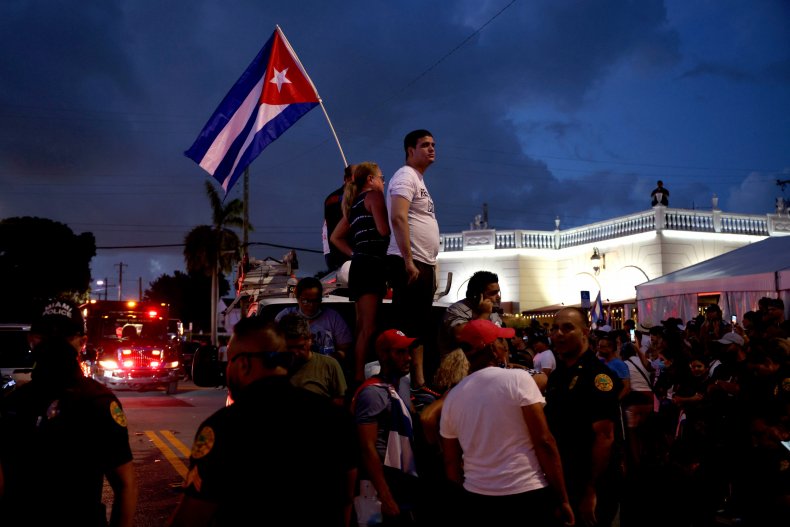Ron DeSantis Applauds Rare Cuba Protests as Havana Says U.S. Plotting Intervention
Florida Governor Ron DeSantis applauded the rare anti-government protests in Cuba on Sunday night, as President Miguel Díaz-Canel blamed the U.S. for the unrest in a nationally televised speech.
In an unprecedented display of discontent, thousands of Cubans took to the streets in cities across the island demanding food, medicine and an end to the decades-long dictatorship amid an economic crisis, worsened by a surge in COVID-19 cases and lack of vaccines. "Freedom! We want freedom," protesters chanted in videos shared to social media, as they marched on Havana, the country's capital. "Down with Communism!"
"Florida supports the people of Cuba as they take to the streets against the tyrannical regime in Havana," DeSantis tweeted. "The Cuban dictatorship has repressed the people of Cuba for decades & is now trying to silence those who have the courage to speak out against its disastrous policies."
Florida supports the people of Cuba as they take to the streets against the tyrannical regime in Havana. The Cuban dictatorship has repressed the people of Cuba for decades & is now trying to silence those who have the courage to speak out against its disastrous policies#SOSCuba pic.twitter.com/H71EYoKdUZ
— Ron DeSantis (@GovRonDeSantis) July 11, 2021
The protests are viewed as remarkable in a Communist country that represses dissidents with crackdowns enforced by police surveillance and control. Cuban officials shut down the internet in the afternoon, as law enforcement began arresting and charging protesters, while deploying tear gas to disperse the crowds.
In an impromptu afternoon address, Díaz-Canel accused the U.S. of "provoking a social uprising" in an alleged plot to legitimize a military intervention. "We are not going to hand over the sovereignty or the independence of the people," he said. "There are many revolutionaries in this country who are willing to give our lives, we are willing to do anything, and we will be in the streets fighting."
"The order to combat has been given. Revolutionaries need to be on the streets," Díaz-Canel concluded. He did not make any concessions to protesters.
As protests erupted in Havana, San Antonio de los Baños and Palma Soriano, areas outside the country with sizable populations of Cubans, including Miami, have also seen people march through streets in support of the protests in Cuba.
The decades-long U.S. trade embargo has significantly limited Cuba's ability to trade and grow its economy. Havana's capacity to produce agriculture has also been plagued by persistent inefficiencies and disabling bureaucracy, causing essential food shortages across the country and long lines for basic necessities.
Additionally, the country has struggled to mitigate the spread of COVID-19, which further worsened its economic conditions. Health officials reported a record number of new cases and deaths on Sunday, two days after the country approved emergency use of its domestically produced vaccine.
Julie Chung, the acting U.S. assistant secretary of state for Western Hemisphere affairs, tweeted: "Peaceful protests are growing in Cuba as the Cuban people exercise their right to peaceful assembly to express concern about rising COVID cases/deaths."
Newsweek reached out to the Cuban Embassy in Washington D.C. for comment. This story will be updated with any response.


